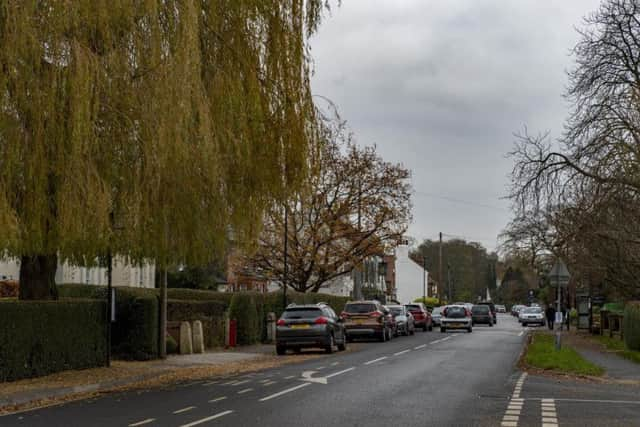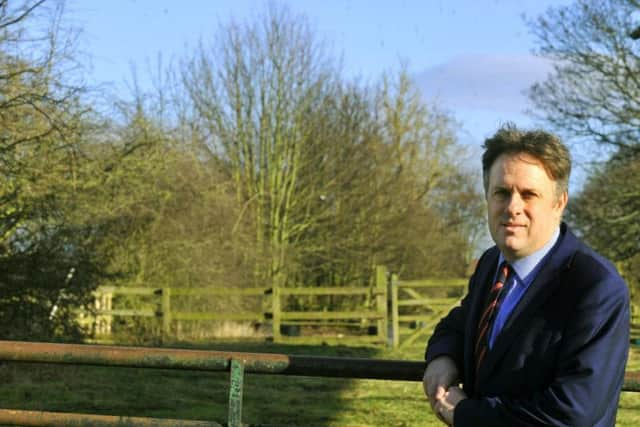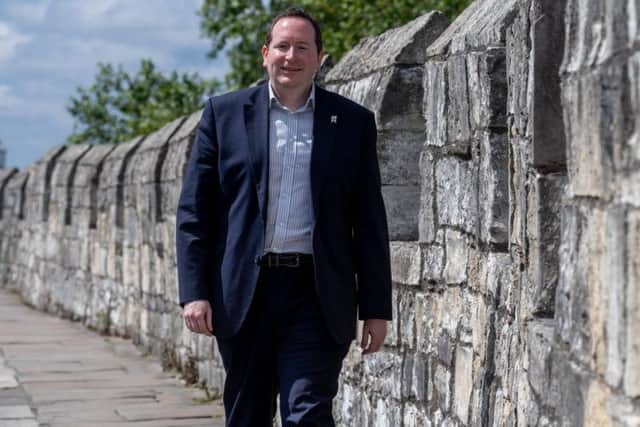York Outer General Election contest hots up as Liberal Democrats and Labour challenge Tory Julian Sturdy
But the lack of a centre is more than just a quirk of the electoral system and hints at the changing way of life for many in the villages that make up much of its population of 75,000 people.
On a visit to affluent Bishopthorpe this week, The Yorkshire Post is told by one local how the village has lost much of its traditional life and identity in recent decades as traditional industries have disappeared and out-of-town supermarkets have taken the trade from local shops.
Advertisement
Hide AdAdvertisement
Hide AdThese days Bishopthorpe is more of a commuter belt village, he suggests, with many residents heading down the A64 to work in Leeds. "It is not the man who gets his push bike out and goes to work any more", he says. "He gets his car."
Despite this trend, Bishopthorpe remains a pleasant place to live. There are four watering holes on the high street, a local butcher and other independent shops.
On a drive through the village around 3pm the main source of activity is mothers and fathers on their way to pick up their children from the 'outstanding'-rated local school, named after the Archbishop of York whose headquarters are just around the corner.


"Generally speaking round here it is a pretty quiet place, there is nothing that bothers me", says Bob Taylor, a 62-year-old maintenance engineer. "I am more interested in the bigger picture."
Advertisement
Hide AdAdvertisement
Hide AdAn enthusiastic Leave supporter, he says that in the General Election on December 12 he will be voting for "whichever [party] is more likely to get us through".
"In all the other ones I have voted for the Brexit Party. In the last election I read the manifestos of most of them. When [Nigel] Farage was in Ukip there was only one thing in the manifestos I didn't agree with."
His preference for leaving the European Union puts him in a minority in York Outer, one of only two Tory-held seats where locals voted in favour of Remain in 2016.


The split in opinion is summed up by two locals enjoying a pint of ale in The Marcia Inn on Main Street. "For me the whole thing is a denial of democracy" one tells The Yorkshire Post, while the other says: "We were better off in Europe than we were without it."
Advertisement
Hide AdAdvertisement
Hide AdConservative Julian Sturdy, who has held the seat since 2010 and has consistently voted in favour of the Government's Brexit deals, concedes that this is the view of locals but adds: "The message I am getting loud and clear is get on with it. People just want to move on."
Describing himself as feeling "passionately" about local issues, he says: "The national politics and national picture in this election tends to take care of itself a little bit."
Mr Sturdy, who comes from a farming background and is the son of former Tory MEP Robert Sturdy, describes transport and education as major local issues, with York schools consistently getting less funding than those in London. "We have some amazing schools in York but they are on a very tight budget," he says.


On transport he has been campaigning, as yet without success, for the dualling of parts of the A64 between York and Scarborough and to get a railway station serving the villages of Strensall and Haxby.
Advertisement
Hide AdAdvertisement
Hide Ad"For a city like York transport and infrastructure investment is really important. Congestion is a big issue on the outer ring road which runs right round my constituency.
"I have managed through a long campaign to secure the dualling of the northern ring road, which is fantastic news. It was a big push by the local council to get that. It will make a big difference to a lot of communities like Haxby, Strensall and Poppleton."
With a majority of more than 8,000, Mr Sturdy faces a three-way contest with the Liberal Democrats and Labour to hold onto the seat.
Keith Aspden, who became leader of City of York Council in May as the pro-EU Lib Dems virtually wiped out the Conservatives, says Brexit is a major talking point on the doorstep. But he is keen to highlight the issues he talks about every day which show "why towns and villages need a better deal".
Advertisement
Hide AdAdvertisement
Hide Ad"Being council leader and a local councillor gives me the benefit of seeing every day, and for the last 16 years I have been a councillor, some of the issues families face in the area but also the frustration that we can't solve them locally", he says.
"A lot of it is about funding nationally and what the government decides to do. It is about taking that experience and using it nationally."
Labour candidate Anna Perrett, a local councillor who moved to York in 2005 to study, cites climate change as a major issue and describes the threat to two villages in the constituency from fracking as energy firms have licences to drill nearby.
She says that though York is an affluent city, residents are still affected by the social care crisis and the over-stretched NHS. In what she says is an "odd-shaped" constituency, people who want to get from village to village by public transport have to go into the city centre and out again.
Advertisement
Hide AdAdvertisement
Hide Ad"We have lost a lot of services as austerity has bitten, they have gone to the city centre to cut costs," she says. "People are having to go into the city centre to find services they used to be able to get in villages."
Parties standing down in their interests of delivering, or stopping, Brexit have been a feature of the contest in York Outer.
The pro-Remain pact between the Lib Dems and the Green Party saw the latter party's candidate withdrawn, while the Brexit Party is also not standing a candidate because the seat is held by the Conservatives. Physicist and historian Scott Marmion is standing as an independent.
In one piece of election literature, Keith Aspden claimed that only the Lib Dems could challenge Julian Sturdy, despite his party finishing a distant third in the 2017 General Election.
Advertisement
Hide AdAdvertisement
Hide AdJustifying the claim, he points to the recent European Parliament elections where the Lib Dems came top in York and in local elections where the party took vast the majority of council seats in the constituency.
He said: "Politics has changed significantly in the past two years. On the doorstep it is quite clear that the options are between the Conservatives and us."
Anna Perrett is dubious about the claim, pointing out that polls are volatile and adding: "It is not as cut and dried as they say."
And according to Julian Sturdy, despite the Lib Dems' strong showing at the local election, the last two General Elections show that Labour is the main threat.
Advertisement
Hide AdAdvertisement
Hide AdHe said: "I have found a lot of people on the doorstep saying they are voting Conservative in the General Election but they did protest vote in the local elections, given the uncertainty that was going on at the time."
Jane Harding, 60, a receptionist at a doctor's surgery in the village Copmanthorpe, said the national political picture meant she was struggling to decide who to vote for.
"I feel very despondent about the whole thing. I have always voted Conservative but this time I can't bring myself to vote for Boris, I definitely don't want Jeremy and third option you don't get anywhere with."